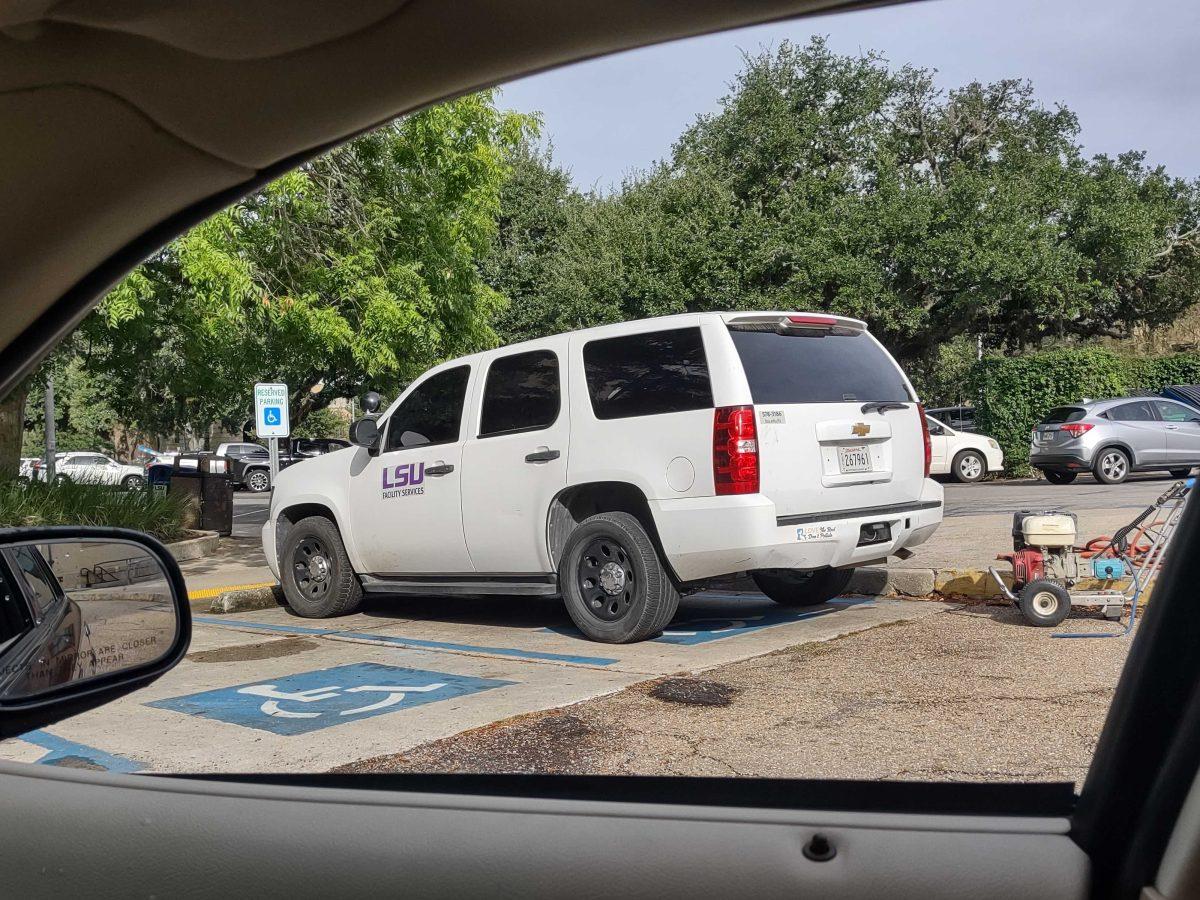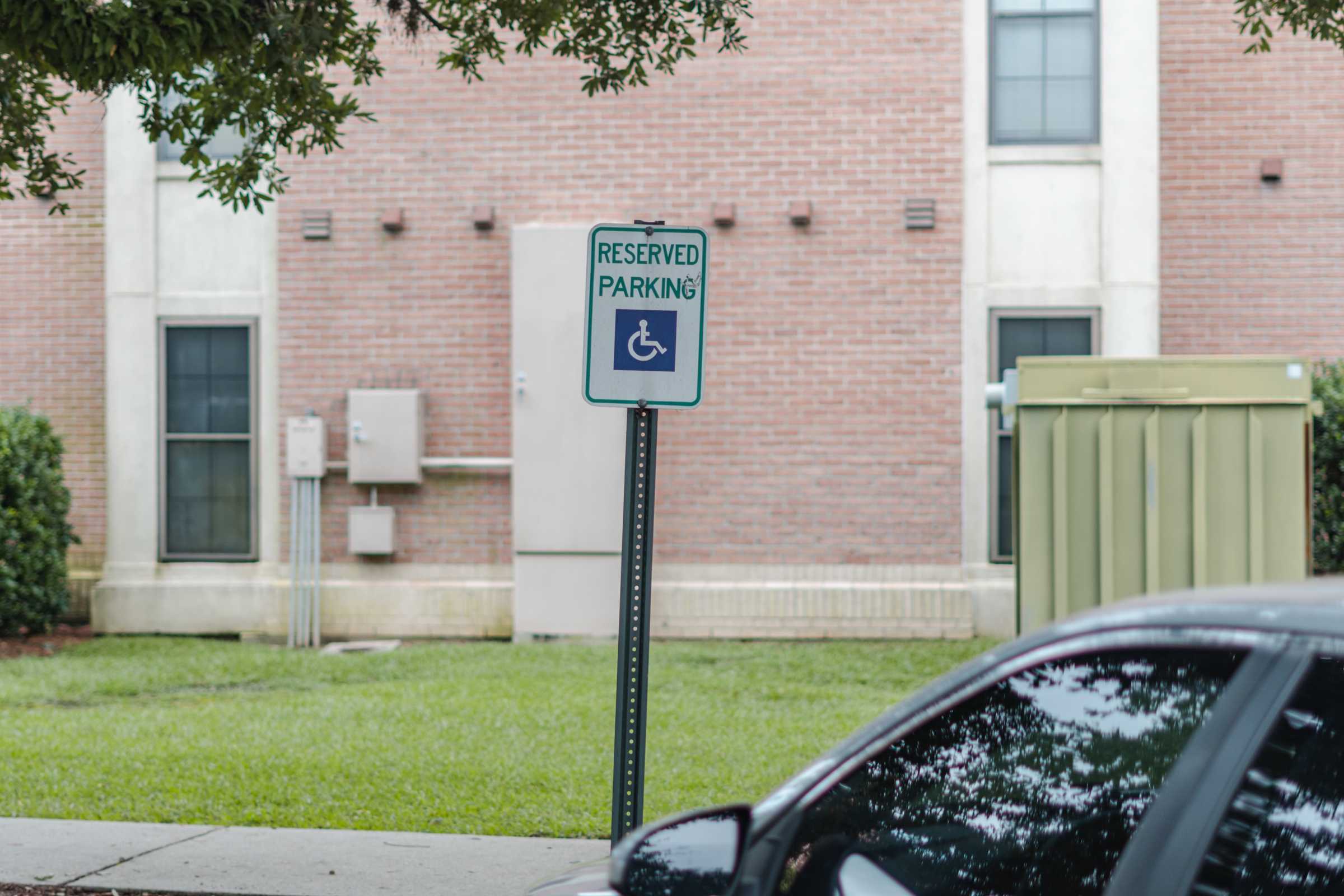Jaren St. Clair’s doctors told him he wouldn’t be able to walk long distances or climb stairs for some time following his two knee surgeries. The finance freshman secured a handicap tag for the fall semester and quickly realized how difficult it was to find available accessible parking on LSU’s campus.
“Every now and then you’ll get lucky, but the spots are scarce,” St. Clair said.
St. Clair said he doesn’t understand what’s stopping LSU from adding more disability parking options for its growing student population. “There’s no reason why the school has so much funding…and can’t have adequate parking,” he said.
LSU students and faculty have complained about a lack of accessible parking, and parking generally, for years. The complaints range from a general lack of options for disabled students, especially if they are trying to get to the Quad; people who are not disabled parking in handicapped spots, including LSU Facility Services vehicles; and difficulty obtaining special parking permits.
Josh Galasso, the transportation demand and parking manager for LSU’s Parking and Transportation Services, said the university is fully compliant with Americans With Disabilities Act regulations.
There are over 450 ADA parking spots on campus, and to park in those spots, Galasso said students and faculty need to request a tag and have doctor verification, which is vetted by Parking and Transportation.
The number of ADA spots required on a college campus is not necessarily based on size or population, Galasso said. Additionally, many buildings in the center of campus don’t have to follow current ADA regulations because of their old age.
“We are in the process of reviewing and doing some renovations to lots. The minute that we touch that lot, do repairs or anything like that, we then have to bring those up 100% to current ADA standards,” Galasso said.
For example, the recent renovations to the Studio Arts Building and Howe-Russell Geoscience Complex will result in a more ADA-accessible lot.
Other than these renovations, LSU has no immediate plans to add more ADA parking spots to campus, Galasso said.
“As far as ADA permit holders, we have enough spaces to fulfill the need on the university campus,” Galasso said. “Now, let’s just say down the road, [there’s] 500 more, and so now you’re at a deficit, we would certainly look at that taking that…into consideration.”
Another common complaint brought up by students is seeing Facility Services vehicles taking up handicapped parking spots. According to students, the white trucks can often be seen in the spots, seemingly using them while fulfilling maintenance requests or other duties.
Political science senior Delaney Ferrer uses handicapped parking due to a leg injury. Her biggest issue came when she had classes in the Quad during the spring, but she also recalled seeing LSU vehicles parked on the sidewalk while working on the East Campus Apartments.
“I see [LSU Facility Services vehicles] parked there all the time, or they’re in, like, the little accessibility…zone,” Ferrer said. “Sometimes I sit there, and I’m like, ‘OK, maybe a Facility Services member is handicapped,’ but there’s no indication of that there, and I think it’s just really frustrating that you’re looking for a parking spot…You’re already having trouble getting to your class because of your disability and then you see that and that just kind of stinks.”
A student who requested anonymity said they once saw LSU Facility Services vehicles blocking off multiple handicapped parking spaces near the Quad, which causes issues for them since they cannot walk far without experiencing back pain.
“I’ve seen this constantly on campus – people parking in handicapped spots…And not just students or faculty…Facility Services,” the student said.
After reaching out to LSU Police following one incident in the fall, the student said there were no facility vehicles parked there the next day.
The student has also had issues obtaining a medical tag to park in the handicapped spots. Despite having the proper verification, for their first four years at LSU they would be mailed a commuter tag and would have to wait in line at the Parking and Transportation office to exchange it.
“By limiting the number of people who apply for medical permits, [Parking and Transportation] just give them a commuter permit, and then they enter some kind of override in the system. If the parking agent walking around gives [someone] a ticket, they might not know that person should have been allowed to park there,” the student said. “But I got two or three citations, and…I had to keep telling them ‘I’m not paying.’”
Had they known about the handicapped parking situation before enrolling, the student said they likely wouldn’t have chosen to attend LSU, and that issues like parking are part of the overall experience “as a disabled person at this university.”
St. Clair said having LSU Facility Services vehicles parking in handicapped spots is insensitive to students and faculty.
“There are older staff members at LSU that need those parking spots…People have actual trouble moving around…and it’s not being taken seriously,” St. Clair said.
Galasso said that while his department tries its best to enforce rules about vehicles without handicapped tags parking in ADA spots, it can’t fully control where people park.
“We can’t speak for other departments or speak on their behalf. Whether or not that employee that’s working there has an ADA need…they may need to access that just as any individual does, they’re just not going to have a special handicap [tag] because that’s not their specific vehicle,” Galasso said. “There are some other things that could go into play that may not be taken into consideration when an individual sees that.”






